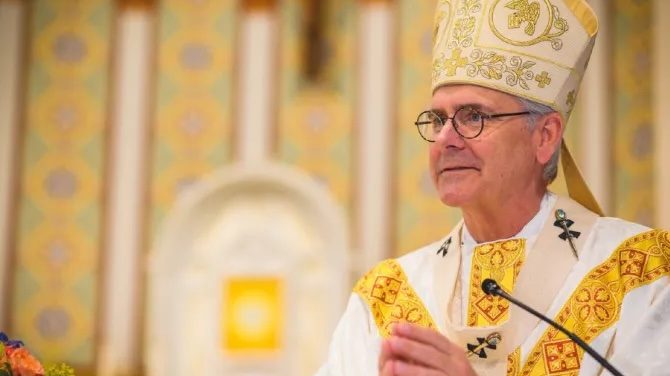Archbishop Paul Coakley of Oklahoma City responded to Oklahoma’s execution of convicted murderer Jemaine Cannon with a call for the abolition of the death penalty, which he called an “archaic punishment.”
Coakley also called for prayers for the condemned man, his victim, and their families.
Cannon, 51, was executed by lethal injection on Thursday morning at the Oklahoma State Penitentiary in McAlester, about a 130-mile drive from Oklahoma City. He was sentenced to die for the 1995 murder of a Tulsa woman with whom he was hiding after escaping from a prison work center, the Associated Press reported.
Coakley, in a Thursday statement posted to social media, saw a contrast between the Oklahoma execution and the end of nationwide legal abortion.
My statement on the execution of Jemaine Cannon: pic.twitter.com/9F2Dzweilr
— Archbishop Paul S. Coakley (@ArchbishopOKC) July 20, 2023
“A year after one of the biggest pro-life victories in the country, the overturning of Roe v. Wade, the state of Oklahoma is imposing the death penalty on Jemaine Cannon,” Coakley said.
“This archaic punishment deprives the condemned of their inherent human dignity and is fundamentally at odds with the culture of life the State of Oklahoma proclaims to be building,” he said. “The sanctity of life does not disappear after the commission of a crime — even a heinous one.”
“I implore all people of goodwill to join me in advocating for an end to the death penalty in Oklahoma and instead working toward actual justice that respects human dignity and prioritizes healing the wounds of grief and loss,” Coakley said.
Cannon’s victim was Sharonda Clark, a 20-year-old mother of two when Clark stabbed her to death with a butcher knife in February 1995. Police discovered her body after she failed to pick up her children from daycare and a relative reported her missing, the Tulsa television show News on 6 reported.
Cannon had been staying at Clark’s Tulsa apartment after his escape from an Oklahoma prison work center where he had been serving a 15-year sentence for the violent assault on another woman who was permanently injured in the attack. Prosecutors said Cannon raped his previous victim and beat her viciously with a claw hammer, an iron, and a kitchen toaster, the Associated Press reported.
Clark’s eldest daughter, Yeh-Sehn White, and Clark’s sister, Shaya Duncan, were witnesses at the execution, which they described as peaceful.
“In my opinion, he died in a very favorable way,” White said, according to the Associated Press. “Unfortunately my mom did not have that opportunity.”
Last month, Cannon spoke via video feed to an Oklahoma Pardon and Parole Board clemency hearing. He claimed he had killed Clark in self-defense. His attorney, Mark Henricksen, told the hearing that Cannon’s trial and appellate attorneys had been ineffective because they did not present evidence to support his claim. The trial attorneys presented no witnesses or exhibits and rested after prosecutors presented their case, Henricksen said.
Cannon further claimed that he was Native American and not subject to Oklahoma jurisdiction.
Also attending the clemency hearing were White, Clark’s daughter, and prosecutors for the attorney general. They argued for execution.
The Oklahoma Pardon and Parole Board rejected clemency by a 3-2 vote.
At Cannon’s execution, he was asked if he had any last words. According to the Associated Press, he responded: “Yes, I confess with my mouth and believe in my heart that God raised Jesus from the dead. Therefore I am saved. Thank you.”
Coakley’s Thursday statement called for prayers.
“Please join me in praying for the soul of Sharonda Clark, her family, Jemaine Cannon, his family, and the corrections staff involved in carrying out the execution,” he said.

